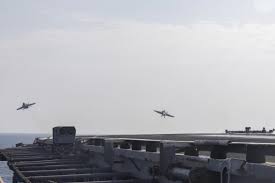Facebook Twitter Instagram Somali Magazine
Amid rising IS threats in Africa, Trump’s decisive airstrike sparks debate over U.S. military commitment in Somalia
Fighting IS in Somalia’s Rugged Terrain
Finding and fighting Islamic State (IS) militants in Africa, especially in Somalia’s remote mountains, is extremely difficult. The rugged terrain provides the fighters with ideal hideouts, making it hard for local and international forces to track them down. However, soon after taking office, U.S. President Donald Trump ordered an airstrike in Somalia’s Puntland region. He then took to social media, declaring, “WE WILL FIND YOU, AND WE WILL KILL YOU!”
Trump’s First Military Strike
The strike carried out less than two weeks into Trump’s presidency, targeted a senior IS leader and other militants. Trump claimed that the attack destroyed IS caves, killed many terrorists, and did not harm civilians. He also used the opportunity to criticize former President Joe Biden, arguing that Biden had failed to act decisively against terrorists. “Biden and his cronies wouldn’t act quickly enough to get the job done. I did!” he boasted.

Concerns Over U.S. Commitment
Many in Somalia were caught off guard by the strike. Some had feared that the U.S. would abandon them under Trump’s leadership, especially since he had withdrawn about 700 American troops from Somalia during his first term. Biden later reversed that decision and sent troops back to train Somali forces and conduct airstrikes. Somalia’s government, worried about losing U.S. support, even signed a $600,000-a-year deal with an American lobbying firm to maintain good relations with Washington.
Doubts About Somalia’s Government
Despite U.S. involvement, some American officials question whether Somalia’s government is a trustworthy partner. They argue that the large amounts of military aid provided in recent years have had little impact. Puntland, a semi-autonomous region in Somalia, takes a different approach to counterterrorism. It relies less on foreign troops and more on its own forces, supported by Kenya, Ethiopia, and the UAE. Puntland officials say they have been fighting IS for years but receive little recognition for their efforts.
The Growing Threat of IS-Somalia
IS has been active in Somalia for nearly a decade but was once considered less dangerous than the al-Qaeda-linked group al-Shabab. However, IS-Somalia has grown in strength and influence, both within Africa and internationally. U.S. and Puntland officials believe that IS-Somalia’s leader, Abdulqadir Mumin, may now be the global head of IS. Although reports surfaced last year suggesting he had been killed in a U.S. airstrike, his death has not been confirmed.
IS-Somalia’s Expanding Influence
IS-Somalia is playing an increasing role in the larger Islamic State network. Experts warn that it could help plan attacks in Western countries, including the U.S. It also has connections with Iranian-backed Houthi rebels in Yemen, from whom it has received weapons and training. This growing influence has alarmed global security officials.
Recruiting Foreign Fighters
The group is rapidly expanding, recruiting fighters from across Africa and the Middle East. A significant number of its members are Ethiopian migrants who arrive in Puntland hoping to cross the sea to find work in Gulf countries. IS often recruits them by offering better pay than they would receive abroad. Experts estimate that IS-Somalia consists of between 600 and 1,000 fighters, with 80% of them being foreigners from countries like Algeria, Libya, Tunisia, and Tanzania.
Recent IS Attacks
In December, IS-Somalia carried out a highly coordinated attack on a Puntland military base. The group later announced that none of the attackers were Somali; instead, they came from seven different countries, highlighting the international nature of the group. The U.S. military estimates that IS-Somalia has doubled in size over the past year, making it an even greater threat.

IS-Somalia’s Financial Network
Beyond its military activities, IS-Somalia has developed a strong financial network. The U.S., the UN, and Somali officials say the group operates a financial hub in Puntland known as the al-Karrar office. This office collects funds and distributes money to IS branches across Africa and beyond. Reports indicate that IS-Somalia raised nearly $2 million in the first half of 2022 by taxing local businesses, farmers, and traders.
The Role of U.S. Airstrikes
Puntland officials believe that continued U.S. airstrikes would greatly assist their fight against IS. Shortly after the latest strike, Puntland police announced the surrender of Abdirahman Shirwa Aw-Said, the leader of IS-Somalia’s assassination squad. However, security experts warn that one strike is not enough. To truly weaken IS-Somalia, the U.S. must commit to consistent military pressure.
The Uncertain Future
Now, the key question remains: Will Trump continue these airstrikes, or was this a one-time show of force? The future of U.S. involvement in Somalia will play a crucial role in determining whether IS-Somalia continues to grow or is successfully dismantled.
